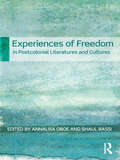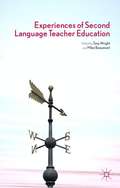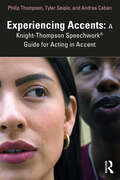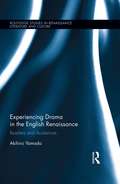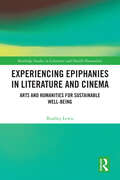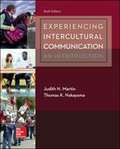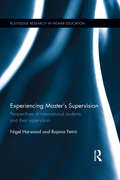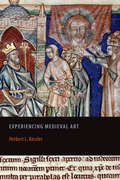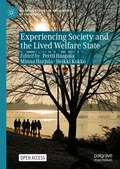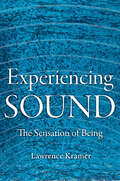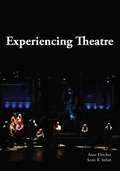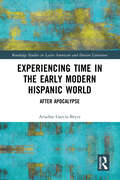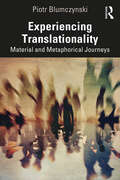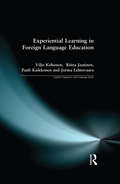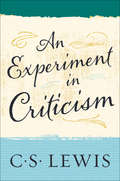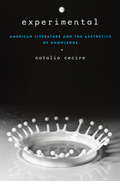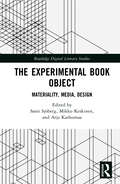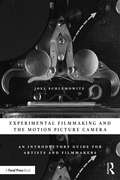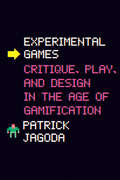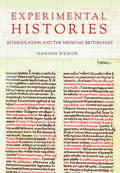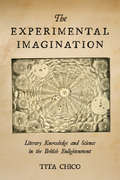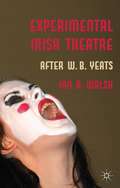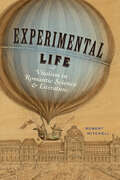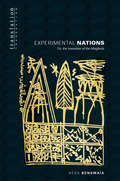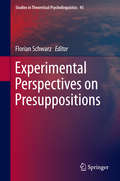- Table View
- List View
Experiences of Freedom in Postcolonial Literatures and Cultures
by Annalisa Oboe Shaul BassiModern ideas of freedom and human rights have been repeatedly contested and are hotly debated at the beginning of the third millennium in response to new theories, needs, and challenges in contemporary life. This volume offers culturally diverse contributions to the debate on freedom from the literatures and arts of the postcolonial world, exploring experiences that evoke, desire, imagine, and perform freedom across five continents and two centuries of history. Experiences of Freedom opens with an introductory philosophical essay by Achille Mbembe and is divided into four sections that consider: • resisting history and colonialism • the right to move and to belong • the right to (believe in) free futures • imaginative freedom and critical engagement. Each section contains a piece of creative writing directly connected to these topics from authors Chris Abani, Anita Desai, Caryl Phillips, and Alexis Wright, followed by a selection of critical essays. Contributors: Chris Abani, Rochelle Almeida, Gil Anidjar, Jogamaya Bayer, Elena Bernardini, Anne Collett, Carmen Concilio, Paola Della Valle, Roberto Derobertis, Anita Desai, Lorna Down, Francesca Giommi, Gareth Griffiths, Dave Gunning, John C. Hawley, Peter H. Marsden, Russell McDougall, Achille Mbembe, Cinzia Mozzato, Kevin Newmark, Berndt Ostendorf, Mai Palmberg, Owen Percy, Kirsten Holst Petersen, Caryl Phillips, Annel Pieterse, Christiane Schlote, Nermeen Shaikh, Patrick Williams, Alexis Wright, and Robert J. C. Young.
Experiences of Second Language Teacher Education
by Tony Wright Mike BeaumontThis book brings together the voices of teacher educators working in different national and educational settings. It Covers themes such as change in teacher education practices, the influences of context on practice, and of interculturality, to provide rich insights into the processes and effects of second language teacher education.
Experiencing Accents: A Knight-Thompson Speechwork® Guide for Acting in Accent
by Philip Thompson Tyler Seiple Andrea CabanExperiencing Accents: A Knight-Thompson Speechwork® Guide for Acting in Accent presents a comprehensive and systematic approach to accent acquisition for actors. It lays out an accessible and effective set of tools, exercises, and theoretical frameworks grounded in current linguistic science, as well as more than two decades of teaching, actor training, and coaching developed by Knight-Thompson Speechwork®. This book dismantles the notions that accents exist on a spectrum of good and bad or that "neutral," "general," or "standard" can serve as ideals for speech. By de-centering elitist and authoritarian worldviews, it gives actors a path to mobilize their innate language abilities to acquire any accent, relying on descriptive and experiential knowledge. The innovative approach of the Four Ps – People, Prosody, Posture, and Pronunciation – builds cultural competence that honors accents as they exist in the world, increases the physical and perceptive skills of the actor, and provides a rich variety of applications to encourage fluid and embodied accent performance. Each of the Four Ps are investigated and practiced separately and then synthesized in the art of the performer, allowing actors to address the complexity of acting in accent through a deliberate and sequential layering of skills, rendering the final expression of their technique meticulously accurate and deeply authentic. Organized into fifteen modules to correspond with a typical semester, Experiencing Accents is perfect for Theatre students in voice, speech, and accents courses, along with working actors interested in improving their accent work.
Experiencing Drama in the English Renaissance: Readers and Audiences (Routledge Studies in Renaissance Literature and Culture)
by Akihiro YamadaThis book investigates the complex interactions, through experiencing drama, of readers and audiences in the English Renaissance. Around 1500 an absolute majority of population was illiterate. Henry VIII’s religious reformation changed this cultural structure of society. ‘The Act for the Advancement of True Religion’ of 1543, which prohibited the people belonging to the lower classes of society as well as women from reading the Bible, rather suggests that there already existed a number of these folks actively engaged in reading. The Act did not ban the works of Chaucer and Gower and stories of men’s lives – good reading for them. The successive sovereigns’ educational policies also contributed to rising literacy. This trend was speeded up by London’s growing population which invited the rise of commercial playhouses since 1567. Every citizen saw on average about seven performances every year: that is, about three per cent of London’s population saw a performance a day. From 1586 onwards merchants’ appearance in best-seller literature began to increase while stage representation of reading/writing scenes also increased and stimulated audiences towards reading. This was spurred by standardisation of the printing format of playbooks in the early 1580s and play-minded readers went to playbooks, eventually to create a class of playbook readers. Late in the 1590s, at last, playbooks matched with prose writings in ratio to all publications. Parts I and II of this book discuss these topics in numerical terms as much as possible and Part III discusses some monumental characteristics of contemporary readers of Chapman, Ford, Marston and Shakespeare.
Experiencing Epiphanies in Literature and Cinema: Arts and Humanities for Sustainable Well-being (Routledge Studies in Literature and Health Humanities)
by Bradley LewisExperiencing Epiphanies in Literature and Cinema uses health humanities and psychological humanities to explore literary and cinematic epiphanies. James Joyce first adopted the term “epiphany” from its religious use to articulate momentsof luminous intensity or “sudden spiritual manifestation.” This study develops and extends Joyce’s use of epiphany through a range of literary and cinematic examples, from William Shakespeare to Ruth Ozeki and from Yasujirō Ozu to Jim Jarmusch. This wealth of epiphanies in the arts is important from a health humanities perspective in that they provide access to aesthetic and sustainable experiences of well-being, joy, and human flowering. They also provide antidotes to aesthetics of anti-epiphany—a showing forth of terror, horror, and panic. Experiencing Epiphanies is accordingly both critical and affirmative, diagnostic and therapeutic. It uses critique to understand the increasing need for well-being in contemporary times, and it uses affirmation to develop underutilized resources in the arts for transforming, configuring, and refiguring our everyday lives.
Experiencing Intercultural Communication: An Introduction
by Judith Martin Thomas NakayamaThe sixth edition of Experiencing Intercultural Communication, An Introduction provides students with a framework in which they can begin building their intercultural communication skills. By understanding the complexities of intercultural communication, students will grow in their professional endeavors and personal relationships. The unique backgrounds of coauthors Judith N. Martin, a social scientist, and Thomas K. Nakayama, a critical rhetorician, bring a distinctive perspective to this thought-provoking subject matter. The Connect course for this offering includes SmartBook, an adaptive reading and study experience which guides students to master, recall, and apply key concepts while providing automatically-graded assessments.
Experiencing Master's Supervision: Perspectives of international students and their supervisors (Routledge Research in Higher Education)
by Nigel Harwood Bojana PetrićMaster’s degree programmes are on the rise, attracting growing numbers of international students who speak English as a second or additional language. Experiencing Master’s Supervision: Perspectives of International Students and their Supervisors explores the experiences of supervising and being supervised at Master’s level, charting the difficulties and joys of learning for second language speakers of English while based at a UK university. The authors report the findings of a year of studying both supervisees and their supervisors in four different departments in the social sciences and humanities at a UK research-intensive university. Using a multiple case study approach, and examining supervision in its natural context, this book presents rich descriptions of five case studies: three student-supervisor dyads and two cases of individual students. Analysing rich, first-hand narratives, chapters identify key aspects of satisfaction and dissatisfaction through the eyes of the participants, focusing upon expectations, supervision styles, feedback and students’ support networks, and discussing the broader implications for university and departmental policy makers, responsible for guidelines and requirements. This book contains important insights into the supervisory experience at Master’s level and will appeal to researchers, academics and postgraduate students in the fields of higher education, TESOL, TEFL/TESL and applied linguistics. This book will also be a useful resource for supervisors, leaders of training sessions for supervisors, and for postgraduate directors and teaching committees at universities who develop supervisory guidelines and preparatory sessions for Master’s students.
Experiencing Medieval Art (Rethinking the Middle Ages)
by Herbert L. KesslerExperiencing Medieval Art is an extensive revision and expansion of the author’s Seeing Medieval Art, originally published in 2004. Renowned art historian Herbert L. Kessler considers often-strange objects and the materials of which they are made, circumstances of production, the conflictual relationship between art objects and notions of an ineffable deity, the context surrounding medieval art, the playfulness of art and the formal movements it engaged, as well as questions of apprehension, aesthetics, and modern presentation. Kessler introduces the exciting discoveries and revelations that have revolutionized the understanding of medieval art and identifies the vexing challenges that still remain. Examining such well-known monuments as the stained glass in Chartres cathedral, mosaics in San Marco Venice, and Utrecht Psalter, as well as newly discovered works – including the frescoes in Rome’s "aula gotica" and a twelfth-century aquamanile in Hildesheim – Kessler makes the complex history of medieval art accessible for students of art history, teachers in the field, and scholars of medieval history, theology, and literature.
Experiencing Society and the Lived Welfare State (Palgrave Studies in the History of Experience)
by Pertti Haapala Minna Harjula Heikki KokkoThis open access book presents a new approach to the history of welfare state. By applying the concepts of experiencing society and the lived welfare state, the collection introduces theoretical, methodological and empirical insights for bridging the everyday life and institutional structures. The chapters analyze how the welfare state as a particular individual-society relationship has become an integral part of living in the modern society. With a long-term perspective, the chapters explore the experience of society which enabled the building and the resilience of a welfare state. As the welfare state is not a universal model of social development but historically unique in different contexts, the book broadens the focus from the Nordic countries to Southern Europe, colonial Asia and post-colonial South America. This collection is essential reading for scholars and students in the social sciences and history, as well as for policymakers and practitioners who face the contemporary and future challenges of the welfare states.
Experiencing Sound: The Sensation of Being
by Lawrence KramerFrom the winds of Mars to a baby's first laugh, a prolific philosopher-composer reflects on the profound imperative of sound in everyday life. Experiencing Sound presents its subject as fundamental to all experience—sensation, perception, and understanding. Lawrence Kramer turns on its head the widespread notion that vision takes pride of place among the senses and demonstrates how paying attention to sound can transform how we make meaning out of experience. Through a series of brief, lyrical forays, Kramer shows that sound, whether heard or unheard, is the object of a primary need and an essential component in the sensation of being alive and the perception of time. It is something that we may suffer—or be made to suffer—as well as enjoy. Like its predecessor The Hum of the World, this book ranges widely across music, philosophy, literature, art, media, and history, from classical antiquity to the present, as it invites us to experience sound anew.
Experiencing Theatre
by Anne Fletcher Scott R. Irelan"Experiencing Theatre completely engages the beginning theatre student in the art of theatre. Students become playwrights, dramaturges, actors, directors, designers, adapters and collaborators though dynamic readings and excercises. This text gives them a great awareness of the work of being a theatre artist. Teachers have long strived towards creating these opportunities for their Intro students--finally a text that will make it happen." --Barbara Burgess-Lefebvre, Robert Morris University
Experiencing Time in the Early Modern Hispanic World: After Apocalypse (Routledge Studies in Latin American and Iberian Literature)
by Ariadna García-BryceThis book considers the new ways time was experienced in the 16th- and 17th-century Hispanic world in the framework of global Catholicism. It underscores the crucial role that the imitation of Christ plays in modeling how representative writers physically and mentally interiorize temporal impermanence as the Messiah’s suffering body becomes a paradigmatic as well as malleable marker of the avatars of earthly history. Particular attention is paid to the ways in which authors adapt Christ-centered conceptions of existence to accommodate both a volatile post-eschatological world and the increased dominance of mechanical clock time. As novel means of communing with Christ emerge, so too do new modes of sensing and understanding time, unleashing unprecedented cultural and literary reinvention. This is demonstrated through close analyses of writings by such influential figures as Saint Ignatius of Loyola, Saint Teresa of Ávila, Carlos de Sigüenza y Góngora, and Sor Juana Inés de la Cruz.
Experiencing Translationality: Material and Metaphorical Journeys
by Piotr BlumczynskiThis innovative book takes the concept of translation beyond its traditional boundaries, adding to the growing body of literature which challenges the idea of translation as a primarily linguistic transfer. To gain a fresh perspective on the work of translation in the complex processes of meaning-making across physical, social and cultural domains (conceptualized as translationality), Piotr Blumczynski revisits one of the earliest and most fundamental senses of translation: corporeal transfer. His study of translated religious officials and translated relics reframes our understanding of translation as a process creating a sense of connection with another time, place, object or person. He argues that a promise of translationality animates a broad spectrum of cultural, artistic and commercial endeavours: it is invoked, for example, in museum exhibitions, art galleries, celebrity endorsements, and the manufacturing of musical instruments. Translationality offers a way to reimagine the dynamic entanglements of matter and meaning, space and time, past and present. This book will be of interest to students and scholars in translation studies as well as related disciplines such as the history of religion, anthropology of art, and material culture.
Experiential Learning in Foreign Language Education (Applied Linguistics and Language Study)
by Viljo Kohonen Riitta Jaatinen Pauli Kaikkonen Jorma LehtovaaraThe goal of foreign language teaching is expanding from communicative competence towards an intercultural action competence. Essential in the new orientation is the shift towards a more balanced emphasis between the external factors in the learning environment and the personal capacity, conceptions, beliefs and assumptions inside the learner's mind. As part of the changes, assessment is seen as an important means of enhancing the elearning processes, emphasising the role of refelctive self-assessment. The text explores and integrates the necessary knowledge base and practices in foreign language education in terms of the basic concepts of experiential learning, intercultural learning, autobiographical knowledge and teacher development, together with the philosophical underpinnings of foreign language education.
An Experiment in Criticism
by C. S. LewisWhy do we read literature and how do we judge it? C. S. Lewis's classic An Experiment in Criticism springs from the conviction that literature exists for the joy of the reader and that books should be judged by the kind of reading they invite. He argues that "good reading," like moral action or religious experience, involves surrender to the work in hand and a process of entering fully into the opinions of others: "in reading great literature I become a thousand men and yet remain myself." Crucial to his notion of judging literature is a commitment to laying aside expectations and values extraneous to the work, in order to approach it with an open mind. Amid the complex welter of current critical theories, C. S. Lewis's wisdom is valuably down-to-earth, refreshing and stimulating in the questions it raises about the experience of reading.
Experimental: American Literature and the Aesthetics of Knowledge (Hopkins Studies in Modernism)
by Natalia CecireA compelling revision of the history of experimental writing from Pound and Stein to Language poetry, disclosing its uses and its limits.In this bold new study of twentieth-century American writing and poetics, Natalia Cecire argues that experimental writing should be understood as a historical phenomenon before it is understood as a set of formal phenomena. This seems counterintuitive because, at its most basic level, experimental writing can be thought of as writing which breaks from established forms. Touching on figures who are not typically considered experimental, such as Stephen Crane, Jacob Riis, Busby Berkeley, Ursula K. Le Guin, and Gottlob Frege, Experimental offers a fresh look at authors who are often treated as constituting a center or an origin point of an experimental literary tradition in the United States, including Gertrude Stein, Ezra Pound, William Carlos Williams, and Marianne Moore. In responding to a crisis of legitimization in the production of knowledge, this tradition borrows and transforms the language of the sciences.Drawing upon terminology from the history of science, Cecire invokes the epistemic virtue, which tethers ethical values to the production of knowledge in order to organize diverse turn-of-the-century knowledge practices feeding into "experimental writing." Using these epistemic virtues as a structuring concept for the book's argument, Cecire demonstrates that experimental writing as we now understand it does not do experiments (as in follow a method) but rather performs epistemic virtues. Experimental texts embody the epistemic virtues of flash, objectivity, precision, and contact, associated respectively with population sciences, neuroanatomy, natural history and toolmaking, and anthropology. Yet which virtues take precedence may vary widely, as may the literary forms through which they manifest. Bringing it up to the 1980s, Cecire reveals the American experimental literary tradition as a concerted and largely successful rewriting of twentieth-century literary history. She shows how the Language poets, a group of primarily white experimental writers, restored to the canon what they saw as modernism's true legacy, whose stakes were simultaneously political and epistemological: it produced a poet who was an intellectual and a text that was experimental.
The Experimental Book Object: Materiality, Media, Design (Routledge Digital Literary Studies)
by Sami Sjöberg Mikko Keskinen Arja KarhumaaThe Experimental Book Object shows why and how books matter in the 21st century. Digital and audio platforms are commonplace, and other fields of art beyond literature have increasingly embraced books and publication as their medium of choice. Nevertheless, the manifold book object persists and continues to inspire various types of experimentation. This volume sets forth an unprecedented approach where literary and media theory are entangled with design practitioners’ artistic research and process descriptions. By probing the paradigm of the codex, this collection of essays focuses on historical and contemporary experimentation that has challenged what books are and could be from the perspectives of materiality, mediation, and visual and typographic design. Investigations into less-studied areas and cases of performativity demonstrate what experimental books do by interacting with their systemic and cultural environments. The volume offers a multifaceted and multidisciplinary view of the book object, the book design and publishing processes, and their significance in the digital age.
Experimental Filmmaking and the Motion Picture Camera: An Introductory Guide for Artists and Filmmakers
by Joel SchlemowitzExperimental Filmmaking and the Motion Picture Camera is an introductory guide to experimental filmmaking, surveying the practical methods of experimental film production as well as the history, theory, and aesthetics of experimental approaches. Author Joel Schlemowitz explains the basic mechanism of the camera before going on to discuss slow and fast motion filming, single-frame time lapse, the long take, camera movement, workings of the lens, and the use of in-camera effects such as double exposure. A comprehensive guide to using the 16mm Bolex camera is provided. Strategies for making films edited in-camera are covered. A range of equipment beyond the basic non-sync camera is surveyed. The movie diary and film portrait are examined, along with the work of a range of experimental filmmakers including Stan Brakhage, Rudy Burckhardt, Paul Clipson, Christopher Harris, Peter Hutton, Takahiko Iimura, Marie Losier, Rose Lowder, Jonas Mekas, Marie Menken, Margaret Rorison, Guy Sherwin, and Tomonari Nishikawa. This is the ideal book for students interested in experimental and alternative modes of filmmaking. It provides invaluable insight into the history, methods, and concepts inherent to experimental uses of the camera, while providing students with a solid foundation of techniques and practices to foster their development as filmmakers. Supplemental material, including links to films cited in the book, can be found at www.experimentalfilmmaking.com.
Experimental Games: Critique, Play, and Design in the Age of Gamification
by Patrick JagodaIn our unprecedentedly networked world, games have come to occupy an important space in many of our everyday lives. Digital games alone engage an estimated 2.5 billion people worldwide as of 2020, and other forms of gaming, such as board games, role playing, escape rooms, and puzzles, command an ever-expanding audience. At the same time, “gamification”—the application of game mechanics to traditionally nongame spheres, such as personal health and fitness, shopping, habit tracking, and more—has imposed unprecedented levels of competition, repetition, and quantification on daily life. Drawing from his own experience as a game designer, Patrick Jagoda argues that games need not be synonymous with gamification. He studies experimental games that intervene in the neoliberal project from the inside out, examining a broad variety of mainstream and independent games, including StarCraft, Candy Crush Saga, Stardew Valley, Dys4ia, Braid, and Undertale. Beyond a diagnosis of gamification, Jagoda imagines ways that games can be experimental—not only in the sense of problem solving, but also the more nuanced notion of problem making that embraces the complexities of our digital present. The result is a game-changing book on the sociopolitical potential of this form of mass entertainment.
Experimental Histories: Interpolation and the Medieval British Past
by Hannah WeaverIn Experimental Histories, Hannah Weaver examines the medieval practice of interpolation—inserting material from one text into another—which is often categorized as being a problematic, inauthentic phenomenon akin to forgery and pseudepigraphy. Instead, Weaver promotes interpolation as the signature form of medieval British historiography and a vehicle of historical theory, arguing that some of the most novel concepts of time in medieval historiography can be found in these altered narratives of the past.For Weaver, historiographical interpolation constitutes the traces of active experimentation with how best to write history, particularly the history of Britain. Historians in twelfth- and thirteenth-century Britain recognized the difficulty of enfolding complex events into a linear chronology and embraced innovative textual methods of creating history. Focusing on the Brut tradition but also analyzing the long history of interpolated historiography, including the Bayeux Embroidery, Experimental Histories offers a new interpretation of generic remixing in medieval writing about the past. Drawing on both manuscript studies and the new formalism, it shows that the practice of inserting materials from romance and hagiography allowed creative revisers to explore how lived events relate to passing time. By embracing interpolation, Weaver provides lively insights into the ways that time becomes history and human actors experience time.
The Experimental Imagination: Literary Knowledge and Science in the British Enlightenment
by Tita ChicoChallenging the "two cultures" debate, The Experimental Imagination tells the story of how literariness came to be distinguished from its epistemological sibling, science, as a source of truth about the natural and social worlds in the British Enlightenment. Tita Chico shows that early science relied on what she calls literary knowledge to present its experimental findings. More radically, she contends that science was made intellectually possible because its main discoveries and technologies could be articulated in literary terms. While early scientists deployed metaphor to describe the phenomena they defined and imagination to cast themselves as experimentalists, literary writers used scientific metaphors to make the case for the epistemological superiority of literary knowledge. Drawing on literature as well as literary language, tropes, and interpretive methods, literary knowledge challenges our dominant narrative of the scientific revolution as the sine qua non of epistemological innovation in the British Enlightenment. With its recourse to imagination as a more reliable source of truth than any empirical account, literary knowledge facilitates a redefinition of authority and evidence, as well as of the self and society, implicitly articulating the difference that would come to distinguish the arts and sciences.
Experimental Irish Theatre
by Ian R. WalshThis book examines experimental Irish theatre that ran counter to the naturalistic 'peasant' drama that became synonymous with Irish playwriting. Focusing on four marginalised playwrights who premiered works after the death of W. B. Yeats, it charts an alternative tradition linking the experimentations of the early Irish theatre movement with the innovations of contemporary Irish and international drama. Drawing on archival material never before published this study rediscovers the vibrant and dissenting smaller theatre companies and playwrights of a forgotten era in Irish theatre. In its concentration on the margins and its emphasis on the performative rather than literary affects of the plays, this book offers a fresh alternative telling of the Irish theatrical story, important works are recovered and the breadth of the Irish canon is widened. This book will prove attractive and satisfying to students, theatregoers, and readers of theatre history, performance studies, modernism, and Irish studies.
Experimental Life: Vitalism in Romantic Science and Literature
by Robert MitchellExperimental Life establishes the multiple ways in which Romantic authors appropriated the notion of experimentation from the natural sciences.Winner of the Michelle Kendrick Memorial Book Prize of the Society for Literature, Science, and the Arts, BSLS Book Prize of the British Society for Literature and ScienceIf the objective of the Romantic movement was nothing less than to redefine the meaning of life itself, what role did experiments play in this movement? While earlier scholarship has established both the importance of science generally and vitalism specifically, with regard to Romanticism no study has investigated what it meant for artists to experiment and how those experiments related to their interest in the concept of life.Experimental Life draws on approaches and ideas from contemporary science studies, proposing the concept of experimental vitalism to show both how Romantic authors appropriated the concept of experimentation from the sciences and the impact of their appropriation on post-Romantic concepts of literature and art.Robert Mitchell navigates complex conceptual arenas such as network theory, gift exchange, paranoia, and biomedia and introduces new concepts, such as cryptogamia, chylopoietic discourse, trance-plantation, and the poetics of suspension. As a result, Experimental Life is a wide-ranging summation and extension of the current state of literary studies, the history of science, cultural critique, and theory.
Experimental Nations: Or, the Invention of the Maghreb (Translation/Transnation #4)
by Réda BensmaïaJean-Paul Sartre's famous question, "For whom do we write?" strikes close to home for francophone writers from the Maghreb. Do these writers address their compatriots, many of whom are illiterate or read no French, or a broader audience beyond Algeria, Morocco, and Tunisia? In Experimental Nations, Réda Bensmaïa argues powerfully against the tendency to view their works not as literary creations worth considering for their innovative style or language but as "ethnographic" texts and to appraise them only against the "French literary canon." He casts fresh light on the original literary strategies many such writers have deployed to reappropriate their cultural heritage and "reconfigure" their nations in the decades since colonialism. Tracing the move from the anticolonial, nationalist, and arabist literature of the early years to the relative cosmopolitanism and diversity of Maghrebi francophone literature today, Bensmaïa draws on contemporary literary and postcolonial theory to "deterritorialize" its study. Whether in Assia Djebar's novels and films, Abdelkebir Khatabi's prose poems or critical essays, or the novels of Nabile Farès, Abdelwahab Meddeb, or Mouloud Feraoun, he raises the veil that hides the intrinsic richness of these artists' works from the eyes of even an attentive audience. Bensmaïa shows us how such Maghrebi writers have opened their nations as territories to rediscover and stake out, to invent, while creating a new language. In presenting this masterful account of "virtual" but veritable nations, he sets forth a new and fertile topography for francophone literature.
Experimental Perspectives on Presuppositions
by Florian SchwarzThis volume brings together some of the most recent developments in the field of experimental pragmatics, specifically empirical approaches to theoretical issues in presupposition theory. It includes studies of the online processing of presupposed content; investigations of the interpretive properties of presuppositions in various linguistic contexts; comparative perspectives relative to other aspects of meaning, such as asserted content and implicatures; cross-linguistic comparisons of presupposition triggers; and perspectives from language acquisition. Taken together, these novel contributions provide a snapshot of state-of-the art developments in this area and will serve as a point of reference for numerous emerging avenues of future work. It makes for an ideal set of readings for advanced university courses on experimental studies of meaning and is a must-read for anyone interested in experimental research on meaning in natural language.
